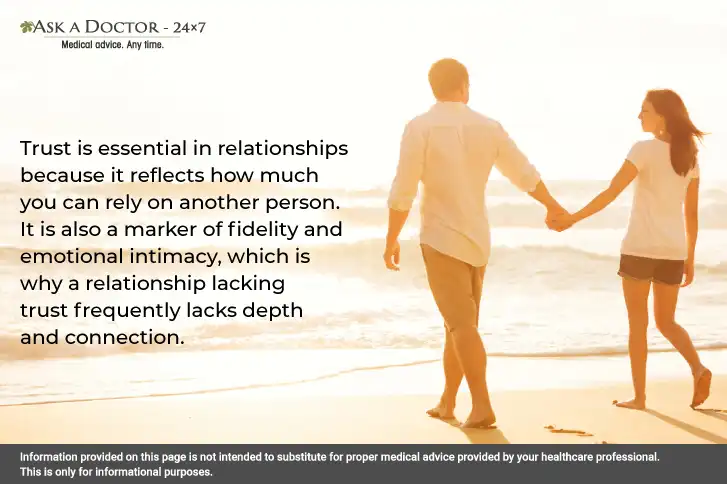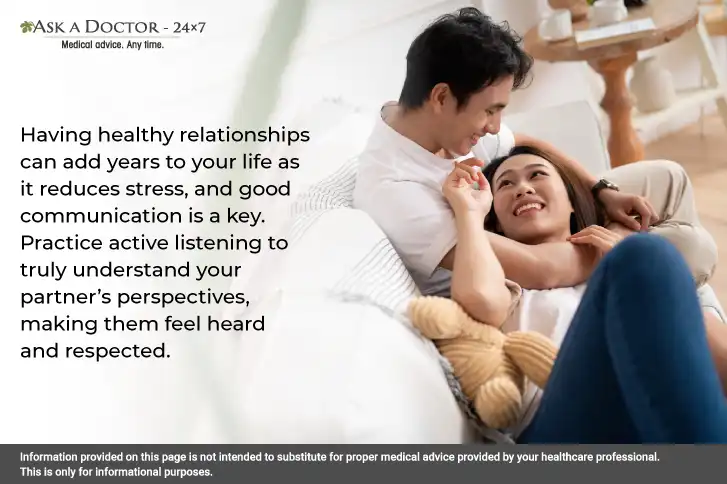10 Tips To Build Trust In A Relationship
Humans have an inherent need to connect, to build relationships, and to be close to others. A quality relationship is shared between two people when they respect, love, support, aid, and encourage one another. Social relationships not only increase intimacy and security but also fortify the link between two people that include lovers, family members, or friends to foster a sense of belonging and security. Nevertheless, trust requires time, work, and consistency to create.
But how do we develop trust in the first place? Is it possible to restore damaged confidence? This article examines how to develop trust in a range of relationships, including helpful advice and trust-building exercises.
Decoding Trust: Tips for Healthy Relationships

Social relationships give us pleasure and can influence our long-term health. We also know it takes time and hard work to establish trust; there isn't any quick fix! However, there are a few essential actions you can take to increase trust in your relationships, regardless of whether you're just getting started or trying to regain it; they are:
1. Maintain open and frequent communication
Engage in open communication. Don't assume that people can read your mind. Express yourself openly, and you will feel closer to your partner. Listen to other people at the same time and value their opinions. Engage in all of these often, ideally daily.
2. Be honest and transparent
The foundation of trust is truthfulness or honesty. Your partner will know they can trust you if you are sincere in both your words and deeds. Always tell the truth, even if it's not easy. Openly express your feelings, ideas, and experiences. Steer clear of secrets and hiding things, as these can gradually undermine confidence.
3. Be mindful of your boundaries
Recognize and respect the emotional, physical, and social limits of your partner. Make sure you always respect them and encourage them to communicate their needs. Respecting your partner's boundaries demonstrates your appreciation for their independence and dedication to their welfare.
4. Don't be self-centered
“It might soon be just you, if it’s everything about you and nobody else.” Being self-centered prevents you from fully considering other people’s needs and feelings, leading to imbalance and potential conflict within the relationship. Hence, always consider the impact of your actions on other people.
5. Encourage your partner's aspirations and goals
Supporting your partner's goals demonstrates your interest in their success and pleasure, which builds trust. Encourage your spouse to follow their dreams and be there for them, whether that means offering support, encouragement, or just a listening ear.
6. Have patience and allow trust to develop
Have patience with both yourself and your lover. Recognize that developing trust takes time. Over time, build trust by being consistent and celebrating little victories. Keep in mind that building trust takes time, particularly in new relationships or if trust has been broken once.
7. Show empathy
Empathy is the ability to comprehend and share another person's emotions. By demonstrating empathy, you showcase your concern for other people and that you’re invested in their well-being. Hence, express empathy and understanding in your speech. Show that you respect other people's feelings by acknowledging their opinions and feelings. By demonstrating to people that their emotions are real, you gain their trust.
8. Establish an appreciation culture
Repairing damaged trust is more likely for couples who discover ways to show each other gratitude. Glorifying the battle is a way to show pride in overcoming significant obstacles in your relationship. Rebuilding trust requires actively discussing your commitment to each other vs. questioning whether you made the right choice.
9. Keep your promises
Reliability is key to building trust. Establishing confidence requires reliability. Your partner will realize they can rely on you if you regularly fulfil your commitments. Don't promise anything you can't maintain. Maintain keeping your word a top priority if you make a commitment. If conditions change, communicate that swiftly and honestly.
10. Practice forgiveness
Last but not least, forgiveness is essential if you wish to mend a relationship. It may be necessary for you to forgive yourself in addition to accepting fault from your partner or fellow companions. It allows people to heal from hurts, rebuild trust, and strengthen their connection by releasing resentment and anger, paving the way for better communication and a more fulfilling partnership.
Benefits of a Healthy Relationship on Your Health
Good relationships don’t just happen, instead, you need to nurture them diligently. The positive impact of healthy relationships on your overall health includes:
1. Engaging in healthier behaviors in positive relationships: You are more likely to refrain from smoking if your spouse or friend does not, and you are more likely to exercise or follow a healthy diet if they do the same.
2. Encourages us to do nice things towards others: Yes, when we are in a healthy relationship, we tend to do nice things for others as well as for ourselves. People want to be kind to others, and this can help us feel like we have a bigger purpose in life. This gives both motivational support and emotional validation that are therapeutic.
3. Reduces stress: Having healthy connections lowers the production of the stress hormone cortisol, which in turn motivates us to do good deeds for both ourselves and other people. One of the best defenses against long-term stress is having social and emotional support.
4. Helps to recover fast from illness: Scientists have proved that those with healthy relationships recover from surgeries or injuries faster and with less pain than those without support. This shows that social support and emotional connection can positively impact both mental and physical health.
5. Promotes long life: You can live longer if you have strong relationships. Happiness and the possibility of adopting healthier habits with our loved ones could be the cause of this.
6. Improves immune system: Social connection can positively impact the immune system, enhancing the body's ability to fight off illness.
Conclusion

Hence, trust is the unseen thread in relationships that keeps two individuals together through difficult times by strengthening their bond. Always remember that building trust in a relationship doesn’t happen overnight. It takes consistent effort, open communication, honesty, empathy, tolerance, acceptability, and understanding. Often, a couple is so overwhelmed that they don’t know where to begin. This is where a counselor or a therapist can be instrumental. Couples counseling is most effective when both partners are open to exploring the struggles in the relationship. They can guide couples with structure and a plan of action to slow down the process of healing to a constructive pace.
If you have any questions about relationship issues and counselling, you can Ask a Psychologist at Ask a Doctor - 24x7.
Recently Answered Queries Related to Relationship
- Feeling Jealousy In A Relationship. Need Advice?
- How To Overcome a Breakup In a Relationship?
- Advice on Relationship Problems
- How To Handle Relationship Problems?
- How To Deal With an External Love Relationship While Already In A Relationship?
- Suggest a Remedy For a Relationship Problem
- Suggest Counselling For Relationship Problems
Disclaimer: Information provided on this page is not intended to substitute for proper medical advice provided by your healthcare professional. This is only for informational purposes.
Ask a Specialist
Recent Questions


